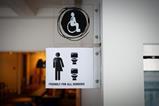Nearly half of Catholics do not feel able to talk about their faith in the workplace, according to a new survey. Caroline Farrow believes employers must do more to ensure Christians are comfortable expressing their beliefs in public

A recent survey conducted by the Catholic Union has confirmed what many Christians have long suspected, namely that our freedom of religion and belief is under threat in the workplace.
The survey, which was undertaken to inform the Catholic Union’s evidence to a Parliamentary enquiry into human rights at work, included some shocking responses, with one person claiming that they were subject to a formal complaint for saying “God bless” to a patient.
Almost a third of respondents said they had felt disadvantaged at work due to their faith and, unsurprisingly, the vast majority of these cases took place in the public sector. One lay chaplain working in a hospital described a “pathological closing down” of chaplaincy services.
Almost half of those surveyed said they felt unable to talk freely about their faith with colleagues
In recent years, most of the high profile cases taken on by legal advocacy group Christian Concern have centred around healthcare. They have fought and won a number of employment tribunals, including on behalf of nurses discriminated against at work for wearing a cross. Just a few days ago, a Catholic priest won £10,000 in compensation from an NHS trust after he was told their policy on equality and diversity took precedence over his religious beliefs, before sacking him following a complaint.
When Catholic priests are being dismissed from chaplaincy positions on account of expressing their Catholic beliefs (which they are presumably employed for) there is clearly a serious problem.
Similar issues were reported in the Arts where, according to one responder, “people are cancelled if they are even suspected to adhere to the teachings of the Catholic Church”.
We should not be expected to leave a key part of our identity at the front door every time we go to work
Bias, illiteracy and hostility
While the survey was aimed at Catholics, it is not unrepresentative of the wider Christian community, and a survey of all denominations would no doubt yield similar results. It would be easy to attribute the problems faced by Christians in the workplace to bigotry or hatred, but the situation is far more complex.
In the case of the NHS, it is not that hospital management and hierarchies believe themselves to be opposed to Christianity but rather, thanks to the scourge of religious illiteracy, they have little understanding of what it means, let alone that there may be any specificity to the Christian faith.
Hospital bosses looking to cut costs don’t understand why they cannot have one generic chaplain, vaguely dispensing fluffy spiritual niceties to patients in their hour of need. They believe one Christian chaplain is as good as the next, and don’t see or understand the need for a Catholic to be given the sacraments by a Catholic priest. Likewise, it would not occur to them that a Baptist minister might not be appropriate for a high church Anglican.
A large part of the problem faced by Christians in the workplace is hostility towards Christian teaching on sex, marriage and issues of life and death. Although this isn’t unique to Christians; as gender-critical feminist Maya Forstator discovered, there is a hierarchy when it comes to protected characteristics - and some are considered more equal than others.
Fear of judgement
Almost half of those surveyed said they felt unable to talk freely about their faith with colleagues, no doubt because they were terrified of disciplinary consequences, should they be perceived to have expressed the wrong opinion, or, as has happened, any mention of religious belief was interpreted as harassment or proselytism.
The survey also revealed that 55 per cent of people felt that Christianity was treated less favourably than other religions at work. One only has to look to the recent SNP leadership contest to see how this is reflected in social attitudes. Kate Forbes was subject to intense criticism as a result of her Christian faith, with some even stating that she was not fit for leadership as a result. Yet not a word was said when Humza Yousaf, who eventually won, posted a photograph of himself leading family prayers for the start of Ramadan, at Bute House, his official residence.
As the United Kingdom moves away from its Christian heritage, Christianity is viewed as quirky and outdated, without the ‘interesting’ or ‘exotic’ draw of other faiths. Western Christians do not have a recent history of violent persecution or oppression with which to score points in the modern psyche of victim top trumps. Nobody is scared of being accused of racism or ‘Chistophobia’, or at risk of violence if they desecrate our holy books, relics or mock Jesus Christ - which is, of course, how things should be.
Society is so used to viewing protected characteristics as a hierarchy of rights, with LGBT at the top, that they simply don’t see Christianity as being in need of protection - especially if it involves views on sexuality which are deemed ‘hateful’ or ‘bigoted’.
Free to be
Cross-bench peer, Lord Alton, has described the survey as highlighting “a blind spot” when it comes to religious freedom at work. Being a Christian is not just a uniform that one puts on, and then discards when it becomes inconvenient. Every action and decision ought to be informed by our faith in Jesus Christ as the resurrected son of God. We should not be expected to leave a key part of our identity at the front door every time we go to work. But this does not, as many non-Christians seem to imagine, entail turning our workplace or office into a Bible study class, or hectoring those who have a different value system.
This survey ought to be seen as a wake-up call to employers, who must take measures to ensure that the human rights of Christians at work are given equal respect. We do not want sterile workplaces where people are unable to discuss their faith traditions, but ones that reflect the colourful diversity of society; where people can openly, respectfully and joyfully share their beliefs, whether that’s Ramadan or Lenten fasting, Shabbat preparations or Diwali celebrations.
Perhaps Christianity should be included in workplace courses on cultural sensitivity? But whatever the answer, we need to reach a situation where Christians can join other minorities in feeling safe to express their full identity at work.





































No comments yet